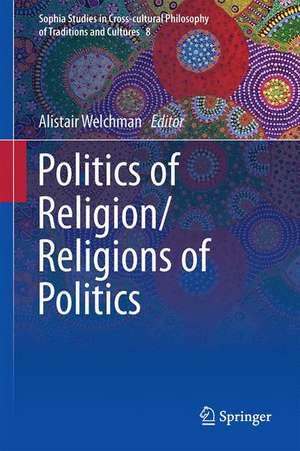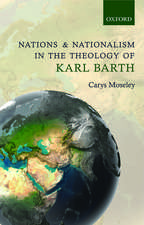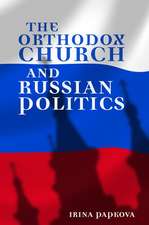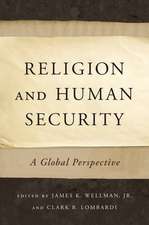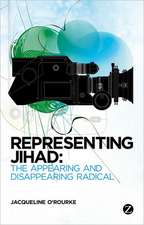Politics of Religion/Religions of Politics: Sophia Studies in Cross-cultural Philosophy of Traditions and Cultures, cartea 8
Editat de Alistair Welchmanen Limba Engleză Hardback – 3 noi 2014
| Toate formatele și edițiile | Preț | Express |
|---|---|---|
| Paperback (1) | 359.96 lei 38-45 zile | |
| SPRINGER NETHERLANDS – 10 sep 2016 | 359.96 lei 38-45 zile | |
| Hardback (1) | 372.98 lei 38-45 zile | |
| SPRINGER NETHERLANDS – 3 noi 2014 | 372.98 lei 38-45 zile |
Din seria Sophia Studies in Cross-cultural Philosophy of Traditions and Cultures
-
 Preț: 395.25 lei
Preț: 395.25 lei - 18%
 Preț: 726.69 lei
Preț: 726.69 lei - 15%
 Preț: 701.72 lei
Preț: 701.72 lei - 15%
 Preț: 651.67 lei
Preț: 651.67 lei - 18%
 Preț: 736.32 lei
Preț: 736.32 lei - 18%
 Preț: 782.10 lei
Preț: 782.10 lei -
 Preț: 375.53 lei
Preț: 375.53 lei - 24%
 Preț: 1038.18 lei
Preț: 1038.18 lei -
 Preț: 375.45 lei
Preț: 375.45 lei - 20%
 Preț: 570.72 lei
Preț: 570.72 lei -
 Preț: 376.15 lei
Preț: 376.15 lei -
 Preț: 378.64 lei
Preț: 378.64 lei -
 Preț: 377.55 lei
Preț: 377.55 lei - 20%
 Preț: 559.19 lei
Preț: 559.19 lei - 20%
 Preț: 568.43 lei
Preț: 568.43 lei - 20%
 Preț: 511.15 lei
Preț: 511.15 lei - 20%
 Preț: 559.19 lei
Preț: 559.19 lei - 20%
 Preț: 567.62 lei
Preț: 567.62 lei - 24%
 Preț: 590.52 lei
Preț: 590.52 lei - 24%
 Preț: 794.96 lei
Preț: 794.96 lei - 24%
 Preț: 585.64 lei
Preț: 585.64 lei - 20%
 Preț: 521.57 lei
Preț: 521.57 lei -
 Preț: 378.64 lei
Preț: 378.64 lei -
 Preț: 479.29 lei
Preț: 479.29 lei - 20%
 Preț: 554.66 lei
Preț: 554.66 lei - 20%
 Preț: 569.85 lei
Preț: 569.85 lei - 15%
 Preț: 578.67 lei
Preț: 578.67 lei - 20%
 Preț: 556.90 lei
Preț: 556.90 lei - 18%
 Preț: 949.10 lei
Preț: 949.10 lei
Preț: 372.98 lei
Nou
Puncte Express: 559
Preț estimativ în valută:
71.38€ • 74.43$ • 59.32£
71.38€ • 74.43$ • 59.32£
Carte tipărită la comandă
Livrare economică 17-24 martie
Preluare comenzi: 021 569.72.76
Specificații
ISBN-13: 9789401794473
ISBN-10: 9401794472
Pagini: 191
Ilustrații: XIII, 191 p.
Dimensiuni: 155 x 235 x 17 mm
Greutate: 0.47 kg
Ediția:2015
Editura: SPRINGER NETHERLANDS
Colecția Springer
Seria Sophia Studies in Cross-cultural Philosophy of Traditions and Cultures
Locul publicării:Dordrecht, Netherlands
ISBN-10: 9401794472
Pagini: 191
Ilustrații: XIII, 191 p.
Dimensiuni: 155 x 235 x 17 mm
Greutate: 0.47 kg
Ediția:2015
Editura: SPRINGER NETHERLANDS
Colecția Springer
Seria Sophia Studies in Cross-cultural Philosophy of Traditions and Cultures
Locul publicării:Dordrecht, Netherlands
Public țintă
ResearchCuprins
Introduction, A. Welchman.- An Aphoristic Memoir: On the Advantages and Disadvantages of Philosophy for Life, A-M. Bowery.- Rethinking Disenchantment and Poesis: Interpreting the Resistance to the Political in Critchley’s Call for Re-Enchantment, T. Chante.- How Much Does That Weigh? Lévinas and the Possibility of Human Rights, J. Stauffer.- To Die Laughing: On Irony and Humor in Limit Situations, C. Bradatan.- You are not your own: On the Nature of Faith, S. Critchley.- Simon Critchley’s Problem of Politics and Hannah Arendt’s Idealism for the USA, R. Champagne.- Contested States: Capital, Resistance and Power, P. Lewis.- Exposures and Projections: Simon Critchley’s Ethics of Appearances, D. Panagia.- Cosmology, Anthropology and Politics: Reflections on Rousseau and ‘Mystical Anarchism’, P. Quadrio.- Protest Politics and Para-Ontology, A. Welchman.- The Sewing Circles of Geneva: Mores, Morals and Moralizing in Political Life, A. O’Byrne.
Notă biografică
Alistair Welchman is an assistant professor of philosophy at the University of Texas at San Antonio who is interested in questions of naturalism and materialism, especially but not exclusively in relation to French and German philosophy since Kant. In addition he works as a translator, mostly of Schopenhauer's World as Will and Representation (for Cambridge) but also of Salomon Maimon's Essay on Transcendental Philosophy (Continuum) and has a growing interest in political questions stemming from his situation on the US-Mexico border.
Textul de pe ultima copertă
The liberal enlightenment as well as the more radical left have both traditionally opposed religion as a reactionary force in politics, a view culminating in an identification of the politics of religion as fundamentalist theocracy. But recently a number of thinkers—Agamben, Badiou, Tabues and in particular Simon Critchley—have begun to explore a more productive engagement of the religious and the political in which religion features as a possible or even necessary form of human emancipation. The papers in this collection, deriving from a workshop held on and with Simon Critchley at the University of Texas at San Antonio in February 2010, take up the ways in which religion’s encounter with politics transforms not only politics but also religion itself, molding it into various religions of politics, including not just heretical religious metaphysics, but also what Critchley describes as non-metaphysical religion, the faith of the faithless. Starting from Critchley’s own genealogy ofPauline faith, the articles in this collection explore and defend some of the religions of politics and their implications. Costica Bradatan teases out the implications of Critchley’s substitution of humor for tragedy as the vehicle for the minimal self-distancing required for any politics. Jill Stauffer compares Critchley’s non-metaphysical religiosity with Charles Taylor’s account of Christianity. Alistair Welchman unpacks the political theology of the border in terms of god’s timeless act of creation. Anne O’Byrne explores the subtle dialectic between mores and morality in Rousseau’s political ethics. Roland Champagne sees a kind non-metaphysical religion in Arendt’s category of the political pariah. Davide Panagia presents Critchley’s ethics of exposure as the basis for a non-metaphysical political bond. Philip Quadrio wonders about the political ramifications of Critchley’s own ‘mystical anarchism’ and Tina Chanter re-reads the primal site in the Western tradition at which the political and the religious intersect, the Antigone story, side-stepping philosophical interpretations of the story (dominated by Hegel’s reading) by means of a series of post-colonial re-imaginings of the play. The collection concludes with an interview with Simon Critchley taking up the themes of the workshop in the light of more recent political events: the Arab Spring and the rise and fall of the Occupy movement.
Caracteristici
First collection of articles to center around the work of Simon Critchley Opens up a productive rather than a reductive interaction between politics and religion, appealing to readers who want to hear something new and positive about religion and politics Contributions are from a Continental Philosophy perspective, attractive to readers familiar with this tradition? Includes supplementary material: sn.pub/extras
